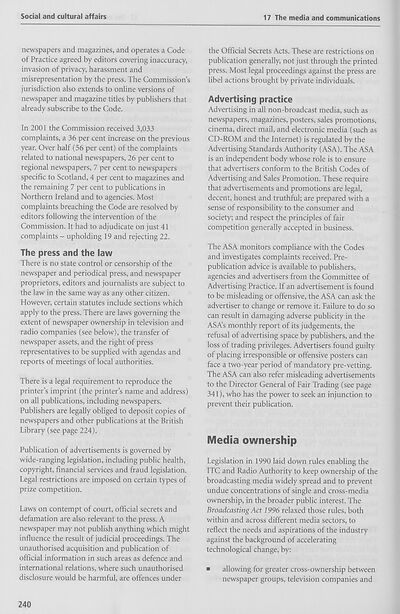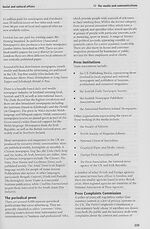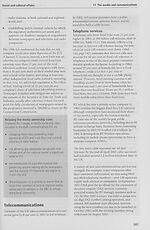Download files
Complete book:
Individual page:
Thumbnail gallery: Grid view | List view

Social and cultural affairs
17 The media and communications
newspapers and magazines, and operates a Code
of Practice agreed by editors covering inaccuracy,
invasion of privacy, harassment and
misrepresentation by the press. The Commission’s
jurisdiction also extends to online versions of
newspaper and magazine titles by publishers that
already subscribe to the Code.
In 2001 the Commission received 3,033
complaints, a 36 per cent increase on the previous
year. Over half (56 per cent) of the complaints
related to national newspapers, 26 per cent to
regional newspapers, 7 per cent to newspapers
specific to Scotland, 4 per cent to magazines and
the remaining 7 per cent to publications in
Northern Ireland and to agencies. Most
complaints breaching the Code are resolved by
editors following the intervention of the
Commission. It had to adjudicate on just 41
complaints - upholding 19 and rejecting 22.
The press and the law
There is no state control or censorship of the
newspaper and periodical press, and newspaper
proprietors, editors and journalists are subject to
the law in the same way as any other citizen.
However, certain statutes include sections which
apply to the press. There are laws governing the
extent of newspaper ownership in television and
radio companies (see below), the transfer of
newspaper assets, and the right of press
representatives to be supplied with agendas and
reports of meetings of local authorities.
There is a legal requirement to reproduce the
printer’s imprint (the printer’s name and address)
on all publications, including newspapers.
Publishers are legally obliged to deposit copies of
newspapers and other publications at the British
Library (see page 224).
Publication of advertisements is governed by
wide-ranging legislation, including public health,
copyright, financial services and fraud legislation.
Legal restrictions are imposed on certain types of
prize competition.
Laws on contempt of court, official secrets and
defamation are also relevant to the press. A
newspaper may not publish anything which might
influence the result of judicial proceedings. The
unauthorised acquisition and publication of
official information in such areas as defence and
international relations, where such unauthorised
disclosure would be harmful, are offences under
the Official Secrets Acts. These are restrictions on
publication generally, not just through the printed
press. Most legal proceedings against the press are
libel actions brought by private individuals.
Advertising practice
Advertising in all non-broadcast media, such as
newspapers, magazines, posters, sales promotions,
cinema, direct mail, and electronic media (such as
CD-ROM and the Internet) is regulated by the
Advertising Standards Authority (ASA). The ASA
is an independent body whose role is to ensure
that advertisers conform to the British Codes of
Advertising and Sales Promotion. These require
that advertisements and promotions are legal,
decent, honest and truthful; are prepared with a
sense of responsibility to the consumer and
society; and respect the principles of fair
competition generally accepted in business.
The ASA monitors compliance with the Codes
and investigates complaints received. Pre¬
publication advice is available to publishers,
agencies and advertisers from the Committee of
Advertising Practice. If an advertisement is found
to be misleading or offensive, the ASA can ask the
advertiser to change or remove it. Failure to do so
can result in damaging adverse publicity in the
ASA’s monthly report of its judgements, the
refusal of advertising space by publishers, and the
loss of trading privileges. Advertisers found guilty
of placing irresponsible or offensive posters can
face a two-year period of mandatory pre-vetting.
The ASA can also refer misleading advertisements
to the Director General of Fair Trading (see page
341), who has the power to seek an injunction to
prevent their publication.
Media ownership
Legislation in 1990 laid down rules enabling the
ITC and Radio Authority to keep ownership of the
broadcasting media widely spread and to prevent
undue concentrations of single and cross-media
ownership, in the broader public interest. The
Broadcasting Act 1996 relaxed those rules, both
within and across different media sectors, to
reflect the needs and aspirations of the industry
against the background of accelerating
technological change, by:
■ allowing for greater cross-ownership between
newspaper groups, television companies and
240
17 The media and communications
newspapers and magazines, and operates a Code
of Practice agreed by editors covering inaccuracy,
invasion of privacy, harassment and
misrepresentation by the press. The Commission’s
jurisdiction also extends to online versions of
newspaper and magazine titles by publishers that
already subscribe to the Code.
In 2001 the Commission received 3,033
complaints, a 36 per cent increase on the previous
year. Over half (56 per cent) of the complaints
related to national newspapers, 26 per cent to
regional newspapers, 7 per cent to newspapers
specific to Scotland, 4 per cent to magazines and
the remaining 7 per cent to publications in
Northern Ireland and to agencies. Most
complaints breaching the Code are resolved by
editors following the intervention of the
Commission. It had to adjudicate on just 41
complaints - upholding 19 and rejecting 22.
The press and the law
There is no state control or censorship of the
newspaper and periodical press, and newspaper
proprietors, editors and journalists are subject to
the law in the same way as any other citizen.
However, certain statutes include sections which
apply to the press. There are laws governing the
extent of newspaper ownership in television and
radio companies (see below), the transfer of
newspaper assets, and the right of press
representatives to be supplied with agendas and
reports of meetings of local authorities.
There is a legal requirement to reproduce the
printer’s imprint (the printer’s name and address)
on all publications, including newspapers.
Publishers are legally obliged to deposit copies of
newspapers and other publications at the British
Library (see page 224).
Publication of advertisements is governed by
wide-ranging legislation, including public health,
copyright, financial services and fraud legislation.
Legal restrictions are imposed on certain types of
prize competition.
Laws on contempt of court, official secrets and
defamation are also relevant to the press. A
newspaper may not publish anything which might
influence the result of judicial proceedings. The
unauthorised acquisition and publication of
official information in such areas as defence and
international relations, where such unauthorised
disclosure would be harmful, are offences under
the Official Secrets Acts. These are restrictions on
publication generally, not just through the printed
press. Most legal proceedings against the press are
libel actions brought by private individuals.
Advertising practice
Advertising in all non-broadcast media, such as
newspapers, magazines, posters, sales promotions,
cinema, direct mail, and electronic media (such as
CD-ROM and the Internet) is regulated by the
Advertising Standards Authority (ASA). The ASA
is an independent body whose role is to ensure
that advertisers conform to the British Codes of
Advertising and Sales Promotion. These require
that advertisements and promotions are legal,
decent, honest and truthful; are prepared with a
sense of responsibility to the consumer and
society; and respect the principles of fair
competition generally accepted in business.
The ASA monitors compliance with the Codes
and investigates complaints received. Pre¬
publication advice is available to publishers,
agencies and advertisers from the Committee of
Advertising Practice. If an advertisement is found
to be misleading or offensive, the ASA can ask the
advertiser to change or remove it. Failure to do so
can result in damaging adverse publicity in the
ASA’s monthly report of its judgements, the
refusal of advertising space by publishers, and the
loss of trading privileges. Advertisers found guilty
of placing irresponsible or offensive posters can
face a two-year period of mandatory pre-vetting.
The ASA can also refer misleading advertisements
to the Director General of Fair Trading (see page
341), who has the power to seek an injunction to
prevent their publication.
Media ownership
Legislation in 1990 laid down rules enabling the
ITC and Radio Authority to keep ownership of the
broadcasting media widely spread and to prevent
undue concentrations of single and cross-media
ownership, in the broader public interest. The
Broadcasting Act 1996 relaxed those rules, both
within and across different media sectors, to
reflect the needs and aspirations of the industry
against the background of accelerating
technological change, by:
■ allowing for greater cross-ownership between
newspaper groups, television companies and
240
Set display mode to:
![]() Universal Viewer |
Universal Viewer | ![]() Mirador |
Large image | Transcription
Mirador |
Large image | Transcription
The item on this page appears courtesy of Office for National Statistics and may be re-used under the Open Government Licence for Public Sector Information.
| Britain and UK handbooks > UK: The official yearbook of the United Kingdom of Great Britain and Northern Ireland > 2003 > (270) |
|---|
| Permanent URL | https://digital.nls.uk/204926620 |
|---|
| Attribution and copyright: |
|
|---|---|
| Description | Three volumes of 'UK: The official yearbook of the United Kingdom of Great Britain and Northern Ireland', published annually by the Office of National Statistics from 2002-2005. |
|---|---|
| Shelfmark | GII.11 SER |
| Description | Three titles produced by the British Government from 1954-2005 describing 'how Britain worked'. They are: 'Britain: An official handbook' (1954-1998), 'Britain: The official yearbook of the United Kingdom' (1999-2001), and 'UK: The official yearbook of the United Kingdom of Great Britain and Northern Ireland' (2002-2005). These 50 reports provide an overview of Britain's economic, social and cultural affairs, its environment, international relations, and the systems of government. They give an impartial summary of government policies and initiatives, and explain how public services are organised. |
|---|---|
| Additional NLS resources: |
|

